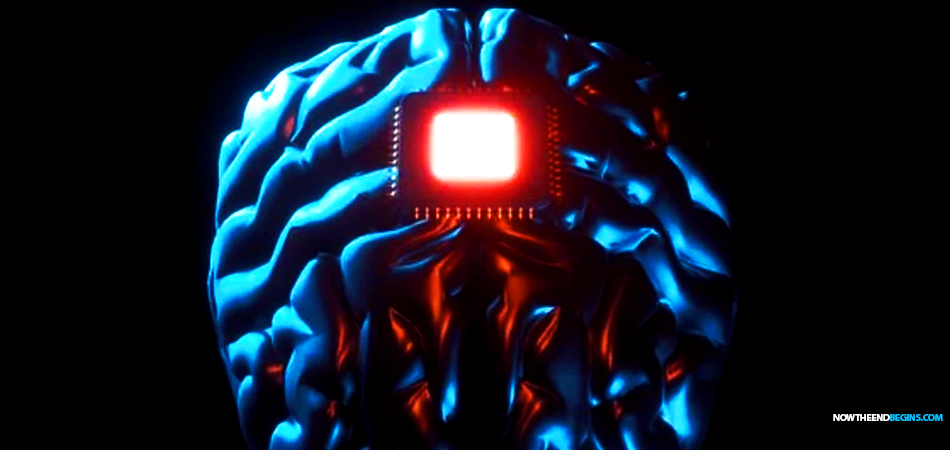
In a surprising move, Peter Thiel, co-founder of Palantir and a venture capitalist has recently invested $10 million in Blackrock Neurotech, a company that does research similar to that of Elon Musk’s Neuralink— mapping the brain.
What is the Mark of the Beast? Glad you asked, it's a human-implantable device that allows the host to conduct financial transactions commonly known as 'buying and selling'. Pretty simple concept to understand, yes? No knowledge of Greek or Hebrew needed, just a dime store King James Bible that bargain stores literally sell for one dollar. So is anyone surprised that that two of the world's top billionaires who make their fortunes with money, Thiel of PayPal and Musk of Bitcoin, are now racing to bring to market the first human-implantable brain chip?
"And he causeth all, both small and great, rich and poor, free and bond, to receive a mark in their right hand, or in their foreheads: And that no man might buy or sell, save he that had the mark, or the name of the beast, or the number of his name. Here is wisdom. Let him that hath understanding count the number of the beast: for it is the number of a man; and his number is Six hundred threescore and six." Revelation 13:16-18 (KJB)
Implantable biometric devices are the hottest sector of the technology field today, as we are watching Silicon Valley working feverishly to turn us into cyborgs. There is no turning back at this point, and the only question is not if this will happen, but how soon it will happen. It's happening.
Brain-computer interfaces (BCIs) acquire, analyze, and translate brain signals into commands that are linked to the devices performing the desired actions.
FROM ANALYTICS INDIA: Peter Thiel who co-founded Paypal with Musk in 1998 is backing Blackrock Neurotech with an undisclosed stake in the company. The company, which is headquartered in Utah, has been serving the neuroscience research community with hardware and software since 2008. It is working on brain-computer interface (BCI) devices that could help improve people’s cognitive abilities.
Blackrock Neurotech CEO Marcus Gerhardt in his conversation with CBNC stated that Blackrock has been generating profits since 2015 despite the tech having a limited market. This was the first time the firm had taken any significant venture capital funding.
Brain Computer Interfaces or BCIs, which are only a few millimetres long, are designed to assist the disabled; to restore the functionality of people with neuromuscular disorders such as ALS , cerebral bias, stroke or spinal cord injury. When it comes to BCIs, Neuralink stands tall. The company has demonstrated its capabilities by making a monkey to play pong using a chip planted on its skull. Whereas, Blackrock Neurotech has claimed success by testing its device on 28 patients across Europe, China, and the U.S. Meanwhile, Neuralink is hoping to start with human trials later this year.
Brain-computer interfaces (BCIs) acquire, analyse, and translate brain signals into commands that are linked to the devices performing the desired actions. BCIs do not use normal neuromuscular exit pathways. The main objective of BCI is to help restore the functioning of people with a neuromuscular disorder. The miniature sensors are placed in areas where the activity needs to be monitored by the doctor. If a patient experiences difficult hand movements, the device would be implanted in the premotor cortex. Once in place, electrodes attached to the device record brain activity (i.e. what the patient is thinking), which are then sent to a computer.
Recently a team of researchers at Stanford University connected a brain-interface device to a paralysed man’s nervous system. The software quickly translated data from the BCI to convert people’s handwriting thoughts into text on a computer screen. The man was able to write twice as fast as he could using an earlier method developed by the scientists from Stanford. The study was conducted by Jaimie Henderson and Krishna Shenoy, who have worked together since 2005 on brain-computer interfaces.
According to Andrew Jackson, professor of neural interfaces at Newcastle University, Blackrock Neurotech still has a long way to go. In his conversation with CNBC , he stated that Neuralink’s device is far more capable than Blackrock Neurotech as it can record more brain cell activity as it has more channel’s (recording sites) than Blackrock’s BCIs. The device is able to record multiple points of the flexible electrodes that are sewn by the surgical robot into the brain as compared to Blackrock which only has a single recording site.
Another point of difference is Blackrock’s patients have wires coming out of their skin. Now both companies are working on wireless devices. But, Blackrock trumps Neuralink in one category. The Thiel backed company has been researching long before Neuralink was conceived. However, the fate of both companies will be decided by their commercial viability and clinical efficiency. So far, the patients didn’t have to pay for the procedures for Blackrock’s BCIs as part of the clinical trial. It will be interesting to see how the company transforms the device to be commercially available by next year. READ MORE
No comments:
Post a Comment